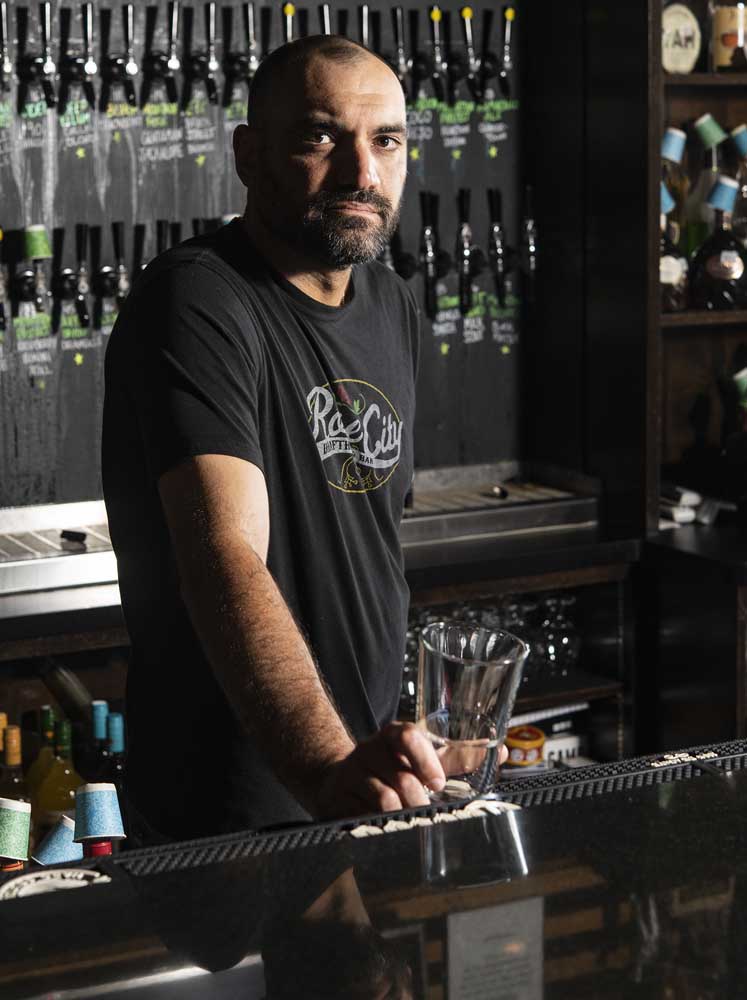Tyler bar owner starts GoFundMe to pay employees
Published 5:00 am Tuesday, August 4, 2020

- Jeremy Nayfa, owner of Rose City Draft House and Bar, in Tyler, pictured here, has started a GoFundMe to pay his employees because orders from Texas Governor Greg Abbott have kept his business closed. He wants to give $1,000 to each of his 10 employees. “We’ve been told twice now. Once we weren’t essential, now we’re just the problem,” Nayfa said. This is the second time Rose City Draft House has been shut down under orders from Governor Abbott. The first shutdown occurred on March 19 and lasted until May 22. On June 26, Abbott ordered bars to close for and restaurants to reduce to 50% occupancy, citing climbing case counts as threats to public safety due to the spread of the coronavirus.
Jeremy Nayfa, the owner of Rose City Draft House and Bar, has started a GoFundMe to pay his employees. He and his workers are banned from reopening the bar due to an order from Gov. Greg Abbott.
“It’s not very easy for people when they have not been told they can’t work,” Nayfa said. “We’ve been told twice now. Once we weren’t essential, now we’re just the problem.”
On June 26, Abbott ordered bars to close and for restaurants to reduce to 50% occupancy, citing climbing case counts as threats to public safety.
“At this time, it is clear that the rise in cases is largely driven by certain types of activities, including Texans congregating in bars,” Abbott said in a news release. “The actions in this executive order are essential to our mission to swiftly contain this virus and protect public health.”
This is the second time Rose City Draft House has been shut down under orders from Abbott. The first shutdown occurred on March 19 and lasted until May 22. Nayfa says Rose City was open for approximately 35 days before the newest order was put in place.
“This time around has been significantly more difficult because we haven’t been given any type of timeline to look forward to,” Nayfa said. “That, mentally, is just not easy to deal with … now there’s nothing but uncertainty.”
Abbott has repeatedly blamed bars and young people for the spike in coronavirus cases, but Nayfa points out that bars have been closed for over five weeks now, and cases are still rising.
“How can anybody, given that evidence, say it was the bars that did it at this point?” Nayfa asked. “He either needs to shut every business down or he needs to let us come back to work.”
Beyond harming just Nayfa and his business, this shutdown of bars could have lasting, economic harm to Tyler.
“It’s going to be devastating,” Tom Mullins, president and CEO of the Tyler Economic Development Council, said. “You’re basically taking out an entire segment of our economy in the process. I understand the frustration of ‘Why is it okay to allow the food-alcohol combination but it’s not okay just to allow for the alcohol side of it?’ It seems capricious.”
Bars, Mullins explained, are small-margin profit organizations that rely on steady cash flow with typically little savings on hand. While Nayfa says he’s been prudent with his money, Mullins warns that a prolonged shutdown could dangerously affect the bars’ workers.
“Then you’ve got all of the staff who are directly impacted because they’re making less than minimum wage in terms of an hourly pay structure, and they’re totally dependent on tips and gratuities for generating a living income,” Mullins said.
Nayfa decided to start a GoFundMe as a way to pay his employees while they’re out of work. Since the extra $600 of unemployment benefits ran out on July 31, he worries their income has been significantly decreased while they’re waiting to reopen. He wants to give $1,000 to each of his 10 employees, but “any little bit counts.”
“I can’t just do nothing for them … I’ve given them money from the bar, I’m personally contributing to this GoFundMe, as are my parents,” Nayfa said. “I mean this is my family. I work with them every day.”
Britney Jo Wallace has worked at Rose City Draft House for a year and a half. She said she felt emotional when she heard that Nayfa had started a GoFundMe, and talked about what else he had done for the employees.
“The first time we shut down, he (Jeremy) paid us for two weeks out of his own pocket to make sure we still had money coming in,” Wallace said. “He even had a cookout at his house. He’s been doing everything for us.”
Not working, Wallace said, has been difficult. Because of her uncertain income, Wallace is moving back home with her parents in Mixon, Texas.
“I wanted to find another job to do something, but nothing I could find would equal my pay that I was getting and was used to and could survive on,” Wallace said. “Financially, even with them giving us unemployment and Jeremy helping us out as well, it wasn’t the same because I wasn’t working for anything that I got.”
Nayfa points out that almost every other industry has been allowed to open, from gyms to churches.
“There’s not social distancing, no one’s complying to the order, I’ve even seen live music, which isn’t supposed to be happening,” Nayfa said. “I’m not anti-people being open, but this is not fair.”
Rose City Draft House and Bar went out of their way to be compliant with the governor’s initial guidelines for reopening in April, Nayfa said. But he’s upset with how unfair the enforcement of guidelines has been.
“You have sheriff’s departments that are in defiance of it because they’re not enforcing it, you have mayors that say they’re not gonna do it, I mean, where’s the law and order? It’s not being handled evenly at all,” Nayfa said. “And that’s frustrating, it’s very frustrating.”
Beyond economic harm to both the owners and employees, Mullins said bars being closed can also deeply harm the community.
“These unique (bars), like Rose City, ETX Brewery, or TrueVine, any of those have become very popular entertainment options for young professionals,” Mullins said. “It’s frustrating to us to see this virus have such a profound impact on that part of our economy because it not only affects that bar or that microbrewery, it affects, indirectly, the quality of life and the culture of the community that we’re trying to nourish.”







